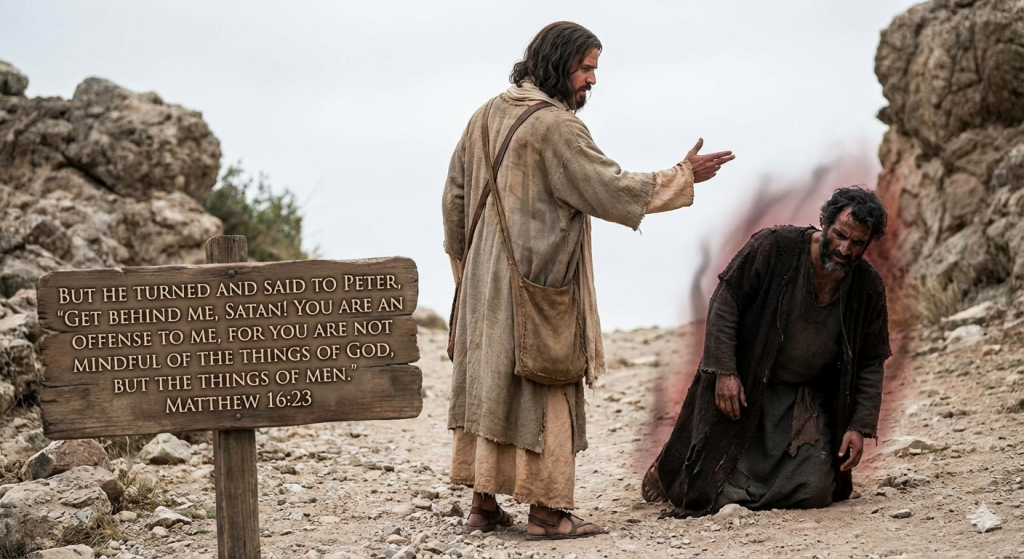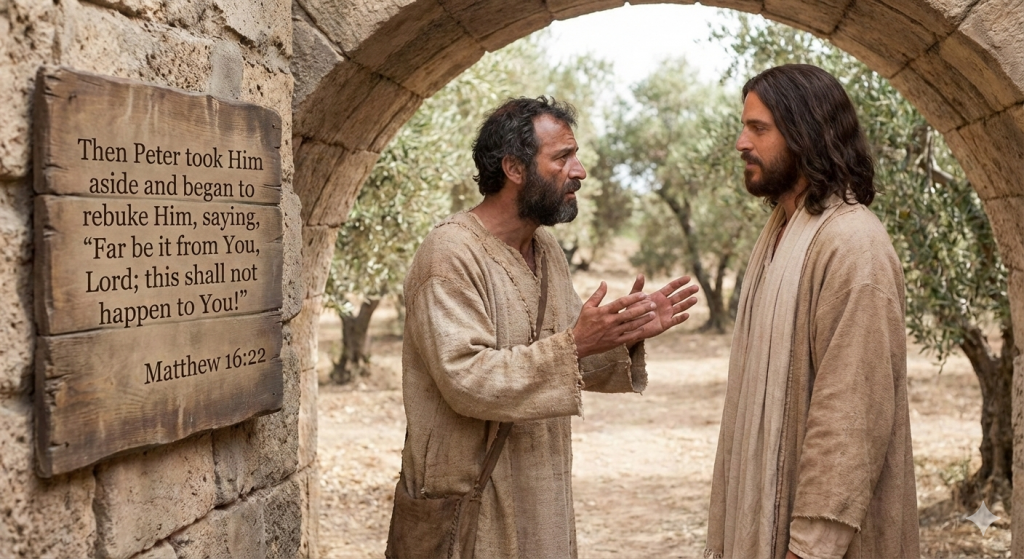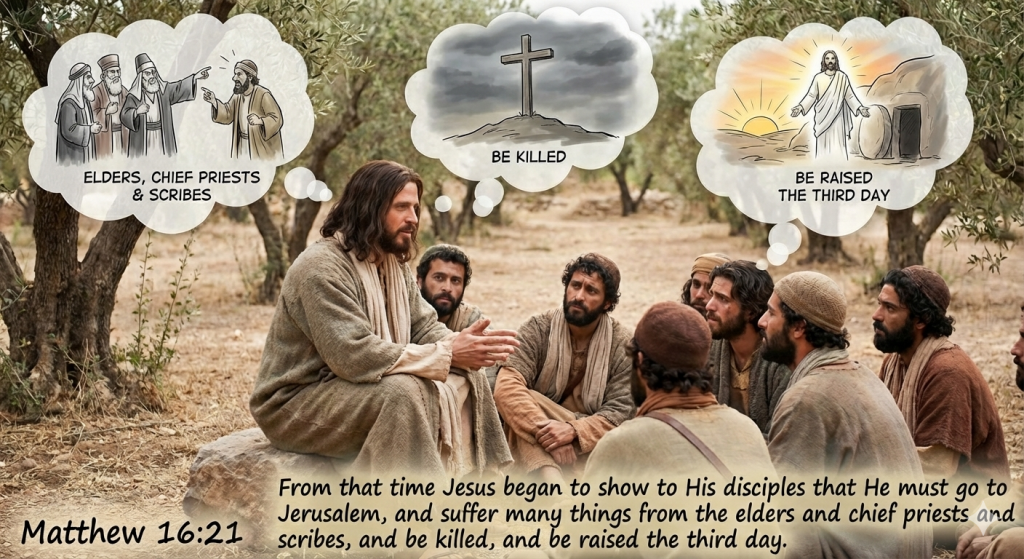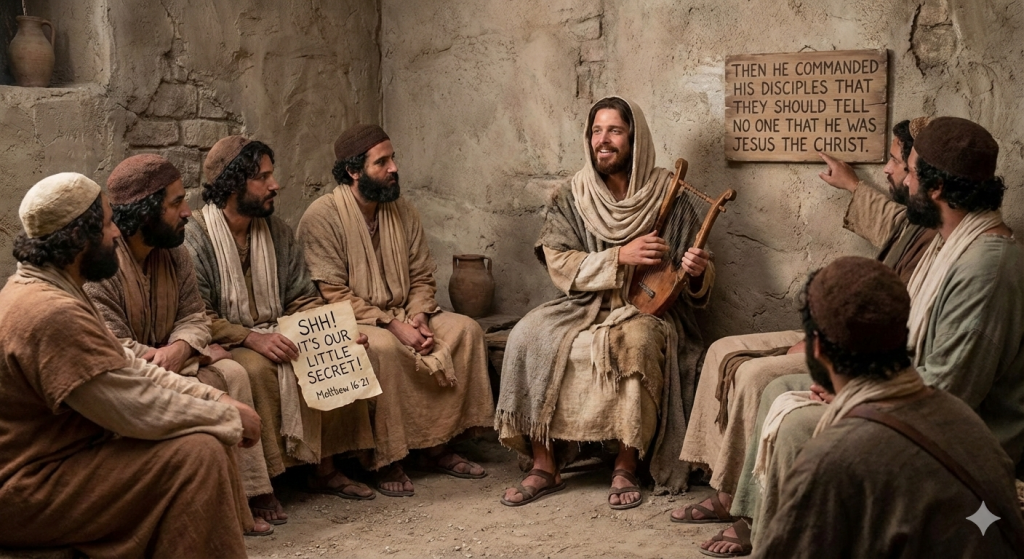Tuesday, 10 February 2026
Then Jesus said to His disciples, “If anyone desires to come after Me, let him deny himself, and take up his cross, and follow Me. Matthew 16:24
Note: You can listen to today’s commentary courtesy of our friends at the “Bible in Ten” podcast. (Click Here to listen)
You can also read this commentary, scrolling with music, courtesy of our friends at “Discern the Bible” on YouTube. (Click Here to listen), or at Rumble (Click Here to listen).
“Then, Jesus, He said to His disciples, ‘If any, he desires to come after Me, let him disown himself, and he took his cross, and he follows Me’” (CG).
In the previous verse, Jesus turned and said to Peter to get behind Him because Peter was an offense to Him. Peter was being mindful of the things of men rather than God. Matthew next records, “Then, Jesus, He said to His disciples.”
Mark and Luke add more detail. Mark says, “When He had called the people to Himself, with His disciples also.” Luke apparently confirms this, saying, “Then He said to them all.” There is no contradiction. Matthew is focusing on the disciples. What Jesus says is, “If any, he desires to come after Me.”
Many translations say, “If any man will come after me…” Unless you are using the word to mean “desire,” which it doesn’t always mean, the thought is insufficient. The word theló signifies a determined intent, such as want, desire, etc. To say, “If any man will,” might include those who do, but don’t desire to do so.
Jesus is referring to those who voluntarily follow in His footsteps. Of them, He continues, “let him disown himself.”
It is a new word, aparneomai, to deny utterly or disown. It is an intensification of arneomai, to deny. There is a sense of an utter refusal to identify with the original source involved. In essence, “I once followed this path. It was my general walk of life. However, I am now following Jesus’ path and utterly reject the one I once followed.”
There is a break from the old to take up the new. In this new path, He next says, “and he took his cross, and he follows Me.”
Notice how Jesus doesn’t say, “And he takes up My cross and follows Me.” This is similar to Matthew 10:38 –
“And who not, he receives his cross, and he follows after Me, not he is worthy of Me” (CG).
In both instances, Jesus instructs His hearers to receive their cross, not His. This, then, is the beginning and fundamental error of ten thousand commentaries and sermons over the years. Does what Jesus just said square with these words –
“The allusion is, to Christ’s bearing his own cross, and Simeon’s carrying it after him, which afterwards came to pass.” John Gill, et. al.
It is true that Jesus has alluded to His suffering and death, but that is future. He is not asking them to pick up His cross at all. They have a cross to bear in following Him at this time. Whatever burden He bears, they should be willing to follow Him. They have no idea that He will die on a cross, and when it happened, they were utterly dejected and confused. In fact –
“Then the one whose name was Cleopas answered and said to Him, ‘Are You the only stranger in Jerusalem, and have You not known the things which happened there in these days?’
19 And He said to them, ‘What things?’
So they said to Him, ‘The things concerning Jesus of Nazareth, who was a Prophet mighty in deed and word before God and all the people, 20 and how the chief priests and our rulers delivered Him to be condemned to death, and crucified Him. 21 But we were hoping that it was He who was going to redeem Israel. Indeed, besides all this, today is the third day since these things happened.’” Luke 24:18-21
These disciples, indicative of all of them, failed to understand anything at all about Jesus’ cross. When Jesus tells them to pick up their cross, He is telling them that whatever burdens they have on His path, even if it results in death, is a path they must choose. This is why Jesus rebuked Peter over His appeal concerning the things He would suffer.
In the new dispensation, the dispensation of grace, which began after Jesus’ completed work, we are not instructed to take up our cross at all. That is failed sermon speak. What does Paul say? In Galatians 6, the answer is seen –
“For not even those who are circumcised keep the law, but they desire to have you circumcised that they may boast in your flesh. 14 But God forbid that I should boast except in the cross of our Lord Jesus Christ, by whom the world has been crucified to me, and I to the world. 15 For in Christ Jesus neither circumcision nor uncircumcision avails anything, but a new creation.” Galatians 6:13-15
Jesus was on a trek to fulfill the law and die in fulfillment of it. Those who followed Him were to see this, understand that this was what had to take place (as He explicitly told them), and to take up their own cross, following Him.
With Jesus’ work complete, we now accept peace with God through His cross.
Life application: The dispensational model is correct. God is working in certain ways at certain times to reveal and complete His plan of redemption. The problem is that even dispensationalist teachers and preachers fail to keep the boxes straight.
We do not have a cross to bear in the sense that people speak of when they evaluate Matthew 16:24. Rather, we have a cross to accept, revel in, and boast about, meaning the cross of Jesus Christ. Pay attention to what Jesus says in the context in which He says it.
Consider the full scope of what He is referring to, including the stunned reaction of those who saw Christ crucified and thought, “We had a failed hope.” Then consider the victory of what really transpired. Jesus Christ did redeem Israel. He also redeemed all of Adam’s fallen seed who are willing to come to Him through His cross.
We don’t have to give up this life to obtain it, except in the sense that we are converted to a new life in Christ positionally. We can continue as plumbers, executives, store clerks, or whatever other profession we find ourselves in. We can continue to live in our homes, remain married to our spouses, and so on.
Revel in the new life you have been given, even as you continue to live out your current life in the presence of God who sent His Son to redeem you unto Himself. Yes, revel in the cross of Jesus Christ our Lord.
Lord God Almighty, You are great and greatly to be praised. All glory, honor, and majesty belong to You, forever and ever. Thank You for Jesus Christ and His cross. May that always be our boast. To Your glory, amen.





